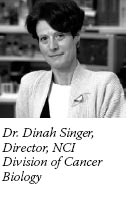 |


Chemotherapy after Surgery Benefits Some Lung Cancer Patients
A new study adds to growing evidence that patients with non-small-cell lung cancer (NSCLC) may benefit from a course of chemotherapy after their tumors have been removed surgically.
Patients who received chemotherapy as early as possible following surgery lived significantly longer than similar patients who had surgery alone, according to findings in the June 23 New England Journal of Medicine (NEJM).
After 5 years, 69 percent of the patients who had surgery and chemotherapy were alive, as compared to 54 percent of the surgery-alone group. Overall, the median survival for the chemotherapy and surgery group was 94 months as compared to 73 months for patients in the surgery-alone group.
Read more 



Guest Update by Dr. Dinah Singer
Protein Structures: A Key to Unknown Treasures
 It took Dr. Max Perutz 22 years to determine the structure of hemoglobin, for which he was awarded the Nobel Prize in 1962. Today, thanks to extraordinary technological advances, including advances in x-ray crystallography techniques initially developed by Dr. Perutz, some protein structures can now be determined in a matter of hours. And, as we are learning, this research is becoming an essential component of developing new cancer treatments.
It took Dr. Max Perutz 22 years to determine the structure of hemoglobin, for which he was awarded the Nobel Prize in 1962. Today, thanks to extraordinary technological advances, including advances in x-ray crystallography techniques initially developed by Dr. Perutz, some protein structures can now be determined in a matter of hours. And, as we are learning, this research is becoming an essential component of developing new cancer treatments.
Yesterday, at the U.S. Department of Energy's (DOE) Argonne National Laboratory outside of Chicago, a ceremony was held to dedicate the first of three new macromolecular crystallography beamlines at Argonne's Advanced Photon Source (APS) synchrotron. This synchrotron produces the most powerful radiation in the Western Hemisphere. The National Cancer Institute (NCI) teamed with the National Institute of General Medical Sciences (NIGMS) and DOE to fund the beamlines' construction and took a lead role in facilitating the construction process. As part of our partnership with NIGMS, NCI receives dedicated time on the beamlines for its researchers.
Read more 
 |
The NCI Cancer Bulletin is produced by the National Cancer Institute (NCI). NCI, which was established in 1937, leads the national effort to eliminate the suffering and death due to cancer. Through basic, clinical, and population-based biomedical research and training, NCI conducts and supports research that will lead to a future in which we can identify the environmental and genetic causes of cancer, prevent cancer before it starts, identify cancers that do develop at the earliest stage, eliminate cancers through innovative treatment interventions, and biologically control those cancers that we cannot eliminate so they become manageable, chronic diseases.

For more information on cancer, call 1-800-4-CANCER or visit http://www.cancer.gov.

NCI Cancer Bulletin staff can be reached at ncicancerbulletin@mail.nih.gov.
|
|